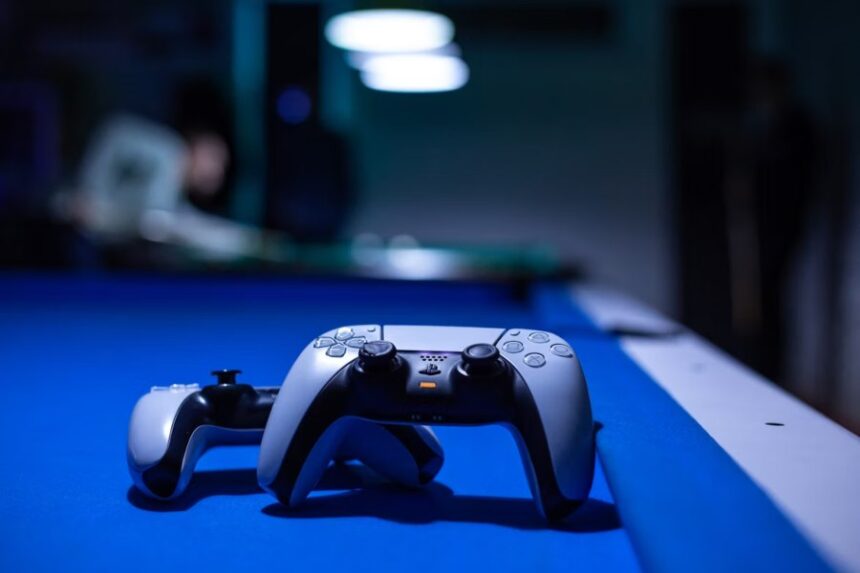Can artificial intelligence make games more creative, or will it replace the human spark that can make digital adventures so memorable? That’s the question experts from the gaming industry are asking themselves — and the answer may not be so certain.
Unlike other creative industries where AI adoption has been more uniform, gaming finds itself in an unusually fractured debate.
The split isn’t, however, all that surprising given that games are as much driven by technology, as they are inspired by art.
On the one hand, developers have always pushed hardware boundaries, but on the other, one could argue that the automation that comes with this has taken away something intangible, yet beautiful from the titles we love (think handcrafted textures vs auto-generated PBR materials).
But AI represents something different — something that can change how games are built, and experienced on a fundamental level.
The efficiency versus creativity debate
Major studios are optimistic about AI. For now, it’s primarily used for behind-the-scenes work: detecting cheaters or generating background assets. Underneath this approach, in internal labs, they are experimenting on more ambitious things. Insiders report AI tools for voice synthesis, automated game design tests, even assets created by AI — it’s already there, they’re just not talking about it publicly yet.
What impact will these tools have on the actual games?
Some experts believe it won’t be good. On the plus side, AI automation can save a studio a lot of money. For example, if we consider making assets — it’s a work-intensive process that involves concept artists, 3D modelers and animators, and a single asset may take tens of billed hours to make. Imagine making thousands of assets in a matter of seconds. This could represent a huge cost-saving for the developer.
On the downside, this can have the same effect as the UE5 engine already has on visuals — many modern games look technically stunning, but they also look remarkably samish. Almost like AI-generated imagery. Spyro the Dragon may not be a technical markwell (today at least), but there’s something in the way it looks that is lost in modern titles. A human touch, if you will.
Beyond that, the reluctance to discuss AI openly stems from a genuine industry schism.
Nintendo, for example, has publicly pledged to avoid generative AI in their game development, while Take-Two’s CEO has dismissed artificial intelligence as “an oxymoron.”
A recent industry survey showed that developer enthusiasm for AI actually dropped from 21% to 13% between 2024 and 2025. Many developers got into gamedev because they want to create. It’s, after all, a creative field. What they don’t want is precisely to curate AI-generated content.
But the real test will come from players themselves. Developers have already experimented with AI-powered NPC and the results were mixed. Being able to enter unscripted interactions with digital characters had a WoW-factor initially, but the novelty quickly wore off. Players quickly noted that the chats were plasticy. “It was like talking to a dumbed down version of ChatGPT,” one player noted.
Is there “the right way” to integrate AI into gamedev? Some experts think that there is — to use AI as a way to empower, rather than replace human creativity. Often this means relying on it in the early stages of the development pipeline.
For example, take platforms like Overchat AI, where you can ask AI assistants for creative writing and brainstorming. You can use them to, essentially, through a bunch of ideas at the wall, and quickly get rough story outlines.
This is similar to a technique artists use to find interesting designs — put almost random blogs of color and value and then find inspiration in the “noise.”
The challenges
Beyond philosophical debates, the industry faces practical hurdles. Game development cycles can span five years or more, making it risky to bet on rapidly evolving AI technologies. There are also concerns about digital storefronts being flooded with low-quality AI-generated games, server costs for AI-powered features, and copyright issues around AI-created content.
Perhaps most significantly, the industry is still recovering from widespread layoffs, making any technology that could eliminate jobs particularly controversial. The fear isn’t just about immediate job losses, but about the long-term impact on the skills and institutional knowledge that make great games possible.
The most promising developments seem to be emerging from developers who view AI as a collaborator rather than a replacement. Instead of fully automated game creation, they’re exploring AI-assisted design tools that can help with specific tasks while preserving the human decision-making that gives games their personality.
This balanced approach might be the key to resolving gaming’s AI civil war. Rather than choosing between human creativity and technological efficiency, the industry may need to find ways to combine both—using AI to handle routine tasks while freeing developers to focus on the creative vision that makes games compelling.
The outcome of this debate will likely shape not just how games are made, but what kinds of experiences players encounter in the years ahead. As one industry expert noted, “The market will dictate the future”—meaning players, not just developers, will ultimately decide whether AI enhances or diminishes the games they love.




